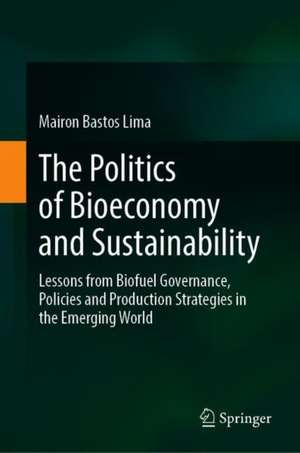The Politics of Bioeconomy and Sustainability: Lessons from Biofuel Governance, Policies and Production Strategies in the Emerging World
Autor Mairon G. Bastos Limaen Limba Engleză Hardback – 16 apr 2021
Multipurpose agriculture gains ever more traction as countries create new bio-based value chains – or, rather, value webs. Governance, in this regard, proves to be key for steering developments towards inclusive agri-food-biomass systems instead of fueling just a handful of “flex crops” ridden with social equity and other environmental issues.
Based on a rich global-level analysis of bioeconomy promotion and three in-depth case studies of key emerging economies (Brazil, India and Indonesia), the book also innovatively examines sustainability politics in Global South democracies. Ultimately, this book is about finding the politics for a fairer bioeconomy in the years and decades to come.
Preț: 785.55 lei
Preț vechi: 957.99 lei
-18% Nou
Puncte Express: 1178
Preț estimativ în valută:
150.31€ • 156.94$ • 124.40£
150.31€ • 156.94$ • 124.40£
Carte disponibilă
Livrare economică 14-28 martie
Preluare comenzi: 021 569.72.76
Specificații
ISBN-13: 9783030668365
ISBN-10: 3030668363
Pagini: 227
Ilustrații: XVI, 227 p. 19 illus., 1 illus. in color.
Dimensiuni: 155 x 235 mm
Greutate: 0.54 kg
Ediția:1st ed. 2021
Editura: Springer International Publishing
Colecția Springer
Locul publicării:Cham, Switzerland
ISBN-10: 3030668363
Pagini: 227
Ilustrații: XVI, 227 p. 19 illus., 1 illus. in color.
Dimensiuni: 155 x 235 mm
Greutate: 0.54 kg
Ediția:1st ed. 2021
Editura: Springer International Publishing
Colecția Springer
Locul publicării:Cham, Switzerland
Cuprins
1. Introduction: Political Dimensions of the Bioeconomy.- Part I: Biofuels and the Emergence of a Bioeconomy World.- 2. The Contested Sustainability of Biofuels in a North-South Context.- 3. Governance: Solving or Reproducing Inequalities.- 4. International Bioeconomy Governance: Unveiling the Initial Patterns.- Part II: Biofuel Governance in Emerging Countries.- 5. Brazil Between Bioeconomy Barons and Grassroots Agroecology.- 6. India’s Bioeconomy and the Ambition over “Wastelands”.- 7. Bioeconomy in the Oil Palm Republic of Indonesia.- 8. Bioeconomy Lessons from Biofuel Policies in Emerging Countries.- 9. The Politics for a Fairer Bioeconomy.
Notă biografică
Mairon G. Bastos Lima started working on bioeconomy governance in 2008. He has since obtained a PhD in environmental studies from the VU University Amsterdam (2014) and published extensively on various themes of environmental politics, particularly in relation to agriculture, social sustainability, and the Global South. Working in Latin America, Sub-Saharan Africa, South and Southeast Asia, he has collaborated on different occasions with the UN Development Programme, the UN Research Institute for Social Development, among others.
Textul de pe ultima copertă
This book addresses the underexposed political dimensions of bioeconomy promotion. Who wins and who loses? How are institutions being shaped, and by whom? Drawing from experiences since the earlier days of biofuels promotion, it explores in unprecedented detail the global drive away from fossil fuels and towards a biomass-based economy.
Multipurpose agriculture gains ever more traction as countries create new bio-based value chains – or, rather, value webs. Governance, in this regard, proves to be key for steering developments towards inclusive agri-food-biomass systems instead of fueling just a handful of “flex crops” ridden with social equity and other environmental issues.
Based on a rich global-level analysis of bioeconomy promotion and three in-depth case studies of key emerging economies (Brazil, India and Indonesia), the book also innovatively examines sustainability politics in Global South democracies. Ultimately, this book is about finding the politics for a fairer bioeconomy in the years and decades to come.
Multipurpose agriculture gains ever more traction as countries create new bio-based value chains – or, rather, value webs. Governance, in this regard, proves to be key for steering developments towards inclusive agri-food-biomass systems instead of fueling just a handful of “flex crops” ridden with social equity and other environmental issues.
Based on a rich global-level analysis of bioeconomy promotion and three in-depth case studies of key emerging economies (Brazil, India and Indonesia), the book also innovatively examines sustainability politics in Global South democracies. Ultimately, this book is about finding the politics for a fairer bioeconomy in the years and decades to come.
Caracteristici
Exposes and analyzes the political dimensions of bioeconomy promotion across the globe Explores the politics of sustainable development in the context of emerging democracies of the Global South, with in-depth case studies on Brazil, India and Indonesia Draws lessons from 15 years of biofuel policies for more equitable and sustainable bioeconomies
